The Elvis cast speaks on how the movie deals with racial appropriation
- Oops!Something went wrong.Please try again later.
Without rhythm and blues, there would be no Elvis Presley, but you might not know it from the way the King has traditionally been depicted in pop culture.
Presley, born in Tupelo, Mississippi, and raised in a working-class neighborhood in Memphis, Tennessee, made early connections with the Black community, finding inspiration in its culture, religious traditions, and music. But often, this aspect of his life remains unexplored, white-washing his past or side-stepping thornier issues of appropriation.
Director Baz Luhrmann's Elvis isn't perfect in this regard either (it downplays Presley's more paranoid, law-and-order obsessed pivot in his later years), but it at least strives to show the world in which Presley came from.
"That's the stuff that gets short shrift in the usual treatment of the Elvis rags-to-riches story," reflects Tom Hanks, who co-stars as the manipulative Colonel Tom Parker. "You usually get the postage-stamp version of it all, but Baz invested a ton of time in Club Handy."
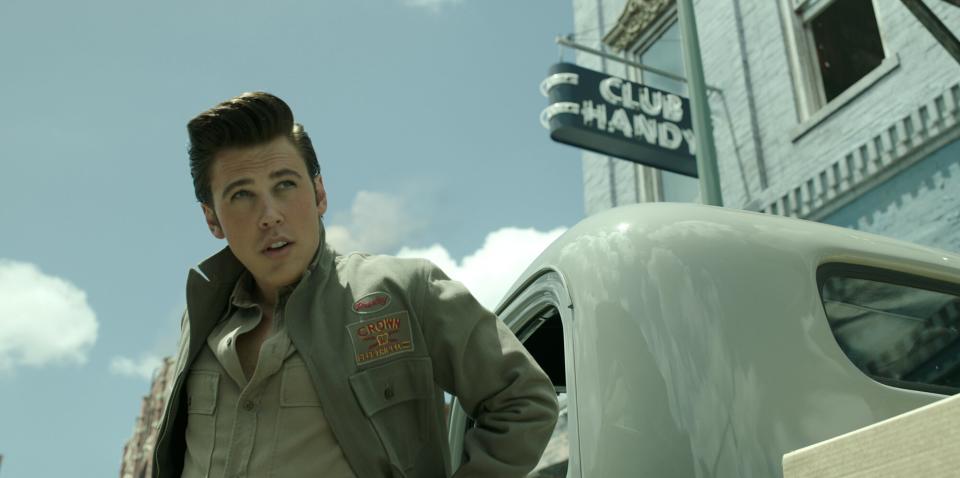
Warner Bros. Pictures Austin Butler in 'Elvis'
Hanks is referring to the legendary Memphis nightclub on Beale Street, which gave a stage to iconic performers like Little Richard (Alton Mason), B.B. King (Kelvin Harrison Jr.), Sister Rosetta Tharpe (Yola), and Big Mama Thornton (Shonka Dukureh).
Elvis does, indeed, spend a fair amount of time in the spot, illustrating the ways in which Presley's unique fashion choices and musical sound stemmed from Black culture. "I'm so grateful that I get to be a part of a film that finally puts his life in context and gives credit where credit is due," says Austin Butler, who stars as Presley. "We don't have Elvis without Black music and without Black culture. He grew up in one of three white houses in a predominantly Black neighborhood. He felt like they were all part of the same family."
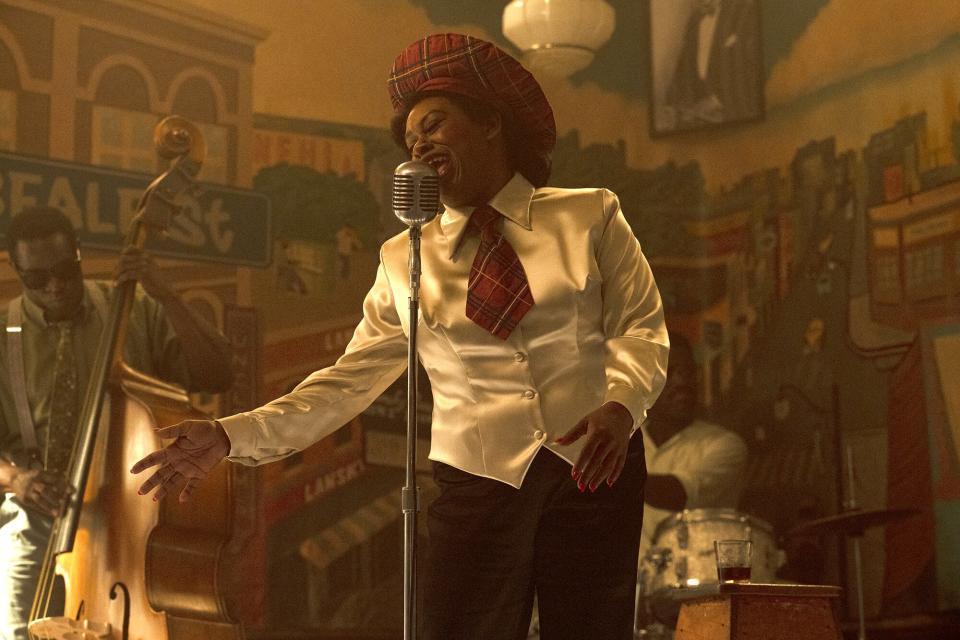
Kane Skennar/Warner Bros. Shonka Dukureh as Big Mama Thornton in 'Elvis'
"Then he ends up going down to Beale Street and falling in love with the music down there and being one of the only white faces in these Black clubs," Butler continues. "And hanging out with B.B. King and watching Little Richard and Big Mama Thornton. And also going to gospel churches and being moved by the spirit of spiritual music at that time. It was so sewn into the fabric of his being — we definitely don't have Elvis without Black music."
Hanks notes that from their earliest conversations, this was a driving concept for director Baz Luhrmann, and a big part of what intrigued him about the project in the first place. "So much of it was the musicality of it," Hanks recounts. "The roots of Black music, the gospel and the R&B that he saw. There was all sorts of musical stuff that Baz wanted to explore: the fusion of American race relations at the time, of a culture that was unseen and the culture that was the commerce of white America."
For the cast members taking on these iconic Black musicians, they had to do deep dives into their characters and their relationship with Elvis. Harrison says his key to finding B.B. King was watching a guitar tutorial that King recorded. "He was explaining how he improvises," says Harrison. "My dad's a musician, so I was like, 'My dad talks like he plays.' And so I was like: Oh, B.B. definitely talks like he improvises. I'm going to take that and put it to the scene work. I'm going to use the music to give him his voice.'"
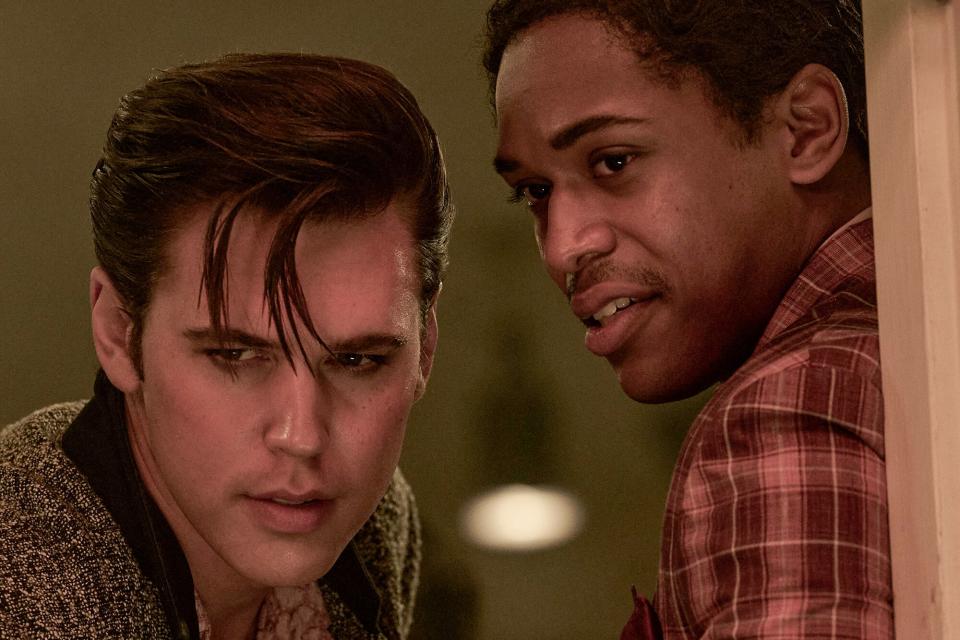
Kane Skennar/Warner Bros. Austin Butler and Kelvin Harrison Jr. in 'Elvis'
Mason, who plays a live-wire Little Richard, had the opportunity to return to his roots in Louisiana and the family legacy of being a descendant of Mahalia Jackson (who, as portrayed by Cle Morgan, also appears in Elvis). "I spent a lot of time back in the soul, in my dad's hometown, and did a lot of digging into our ancestry," Mason says. "I got to tap in to that energy. Segregation and religion and sexuality being in the air — I tapped into that and what that push and pull might feel like, what that frustration might be, and then bringing that to the stage like he would."
"Sister Rosetta Tharpe had a quietness to her and a boldness to her, because you have to be bold to be that out and queer in the '40s," says Yola of her own research and transformation. "Coming from a religious background, you've got to have the stones of all stones to be that bombastic. Sometimes Baz would be like, 'You're holding court.' And I'm like, 'Yes,' but I'm extra, so I can't be holding court like how I would hold court.' There's still a grace to it. I've got to somehow transport myself to this quiet confidence [and be] this person that can emanate this sense of comfort. If you're in the South at that time and you're queer or you feel like you might be, you're not going to feel free. But her space was a space that artists felt free to be really expressive."
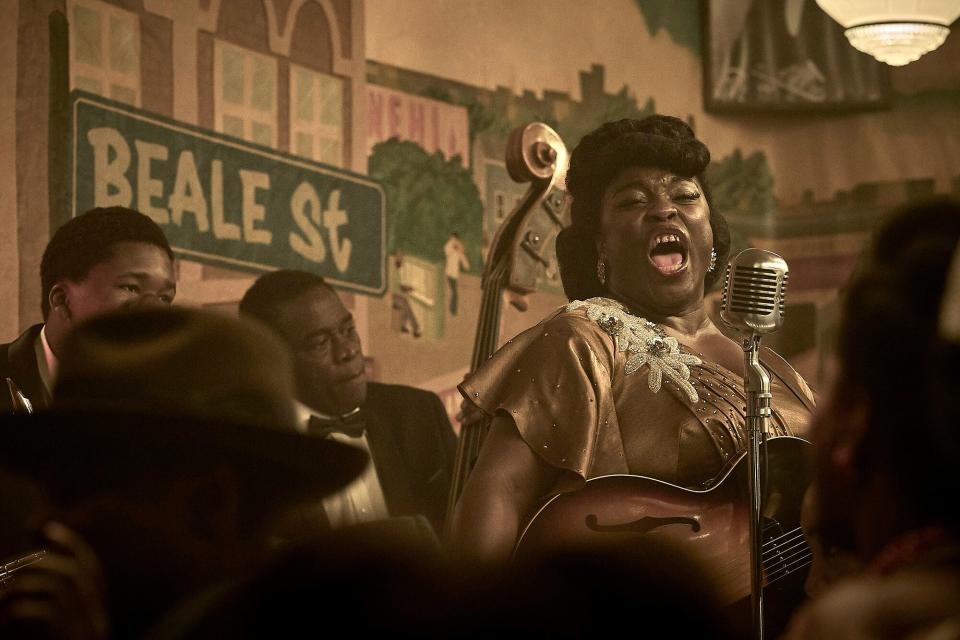
Kane Skennar/Warner Bros. Yola as Sister Rosetta Tharpe in 'Elvis'
All of these notes are part of the sumptuous composition that is Elvis, in its attempts to truly pay deference to the artists Presley loved. The star has long been saddled with credible charges of appropriation and outright theft of Black music — a subject still in need of ample exploration in a big-screen take on Presley. Take for instance, "Hound Dog," a song written by two white men, Jerry Lieber and Mike Stoller, then recorded by Big Mama Thornton, then covered by Presley in what has now become the most popular version. Who has ownership or blame in that complicated process?
In Elvis, Presley's career choices are framed more as appreciation than appropriation.
"There were stories of conversations that he had with B.B. King, which we have in the film," says Butler. "Where Elvis talks about wanting to record a Little Richard song and B.B. says, 'Well, if you do, you'll make a whole lot more money than that kid will ever dream of' — it's really important to have that side of the story. Because you realize that there were times in Elvis' life where he did realize the fact that it wasn't fair."
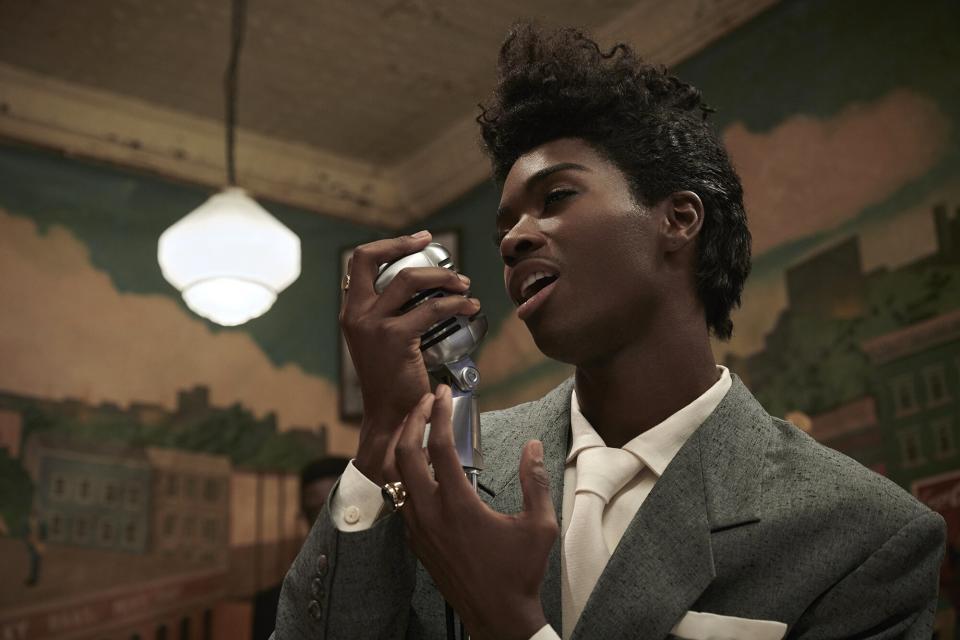
Kane Skennar/Warner Bros. Alton Mason as Little Richard in 'Elvis'
Butler suspects that Presley wasn't more outspoken on behalf of Civil Rights and other issues because the Colonel attempted to clamp down on any such potentially divisive statements. "The way that he spoke to them is through song," adds Butler. "Him singing 'In the Ghetto' and singing 'If I Can Dream' — he had moments of speaking through song to bring people together."
And there were instances, as during an interview portion of his 1968 TV comeback special, where Presley directly states that rock 'n' roll is essentially a blend of gospel and rhythm and blues, crediting the Black music styles that led to his own success.
Just as Presley chose to make his statements through music, so too does Elvis, relying heavily on its soundtrack, which features Black artists like Doja Cat, Gary Clark Jr., Kanye West, and more, to draw parallels between Presley and the groundbreaking artists of today.
"The music overlay reflected the past, the present and the future," says Mason. "You get Doja Cat, you hear some rap, you hear some trap, and then you go all the way to the 1950s with B.B. King and Little Richard and Rosetta Tharpe. That made it new, but also paid homage to where it all originated from. And that felt good to me."
Related content:
